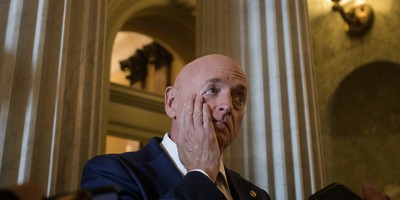"It's the economy stupid" is the infamous mantra conceived by political consultant James Carville that underscored the main issue driving the 1992 presidential race. A few months later, Bill Clinton replaced George H.W. Bush (41) as president, and it was the focus on the economy that got him there.
Today, with lingering high unemployment (hovering at 9 percent with 25 million Americans either unemployed underemployed or discouraged), the presidential election is once again focused on the economy. So it seemed to make sense that the Bloomberg/Washington Post Republican presidential debate held Tuesday night at Dartmouth College in Hanover, N.H., focused only on the economy.
Included in the debate were former Massachusetts Gov. Mitt Romney, former CEO of Godfather's Pizza Herman Cain, Texas Gov. Rick Perry, former Speaker of the House Newt Gingrich, Minnesota Rep. Michele Bachmann, Texas Rep. Ron Paul, former Sen. Rick Santorum of Pennsylvania and former Utah Gov. Jon Huntsman.
Instead of standing at podiums facing the audience, the candidates were seated at an oval table with their three questioners, PBS Anchor Charlie Rose, Washington Post Political Correspondent Karen Tumulty and Bloomberg Television White House Correspondent Juliana Goldman.
Rose laid out the theme: "This debate is different and distinctive. It is only about the economy. So we debate this evening about spending and taxes, deficit and debt, about the present and the future, about rich and poor, and about the role of government."
The next almost two hours focused on the economy and jobs. There were no great surprises. Romney was relaxed, polished and commanded the most time as the front-runner; Cain focused on his 9-9-9 plan (which is not, as Huntsman suggested, the price of a pizza, but Cain's tax plan); Perry showed up, but watchers could barely notice; Gingrich (my father), again showed a greater depth and breadth of knowledge than the rest; Paul focused on the Federal Reserve; Bachmann focused on repealing Obamacare; Santorum landed a few punches on Cain while focusing on the family; and Huntsman focused on delivering a few laugh lines.
Recommended
The juxtaposition between the debate topics and the news that broke on networks Tuesday about the alleged Iranian plot to assassinate the Saudi Arabian ambassador to the United States, Adel-Jubeir, was a reminder that, while it might be "the economy stupid" so far in the 2012 presidential race, national security Issues are also always important.
The alleged plot included Iranians hiring supposed Mexican drug cartel associates (for $1.5 million) to bomb Al-Jubeir's favorite restaurant. "U.S. government charged Mansoor Arbabsiar, a dual U.S.-Iranian citizen, and Gholam Shakuri, an alleged member of the Iranian Quds Force (a division of the Revolutionary Guards), with conspiracy to assassinate the Saudi Arabian ambassador to the United States, Adel Al-Jubeir, and to attack both the Saudi and Israeli embassies in Washington, D.C.," wrote Mohsen Malani for the Foreign Affairs website Tuesday.
This latest development among the complex entities and relationships of the Middle East highlights the knowledge, understanding and resoluteness required of the United States president, who also serves as commander in chief.
The presidency is about more than balancing the budget and sparking the entrepreneurs of America to create wealth. It's about not just navigating international relations but ensuring that the flow of freedom is channeled in the right direction.
We'll need not only the Reagan Recovery in the economy, but the Reagan Resoluteness in regards to international relations.
President Ronald Reagan traveled to Berlin in 1987 to give a speech at the Brandenburg Gate. Tensions were high between the United States and the Soviet Union, but instead of placating the communists, Reagan upped the ante. Reagan provided clear language regarding whom he felt had "won the war" and what must come next. There is "one great and inescapable conclusion," Reagan said. "Freedom leads to prosperity. Freedom replaces the ancient hatreds among the nations with comity and peace. Freedom is the victor."

























Join the conversation as a VIP Member